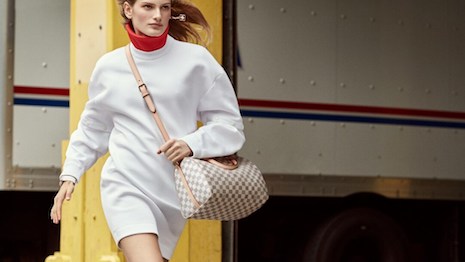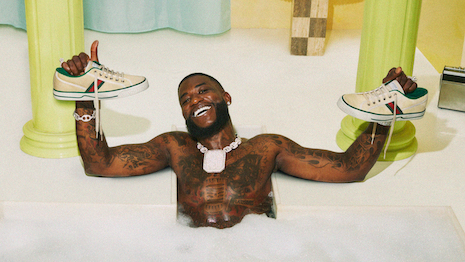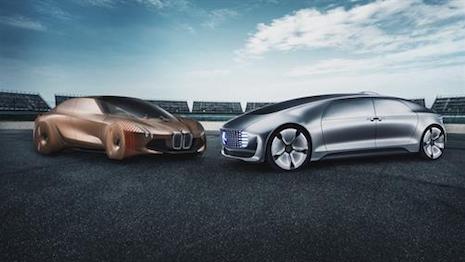 Louis Vuitton is the top ranked luxury label in Interbrand's report. Image credit: Louis Vuitton
Louis Vuitton is the top ranked luxury label in Interbrand's report. Image credit: Louis Vuitton
Heritage houses’ efforts to court a younger clientele through streetwear styles and digital innovation have helped them adapt and gain brand value.
Italian fashion house Gucci’s brand value has risen 23 percent in the past year, making it the fastest growing luxury label in Interbrand’s Best Global Brands rankings. As a category, luxury brands’ values increased an average of 11 percent year-over-year, the steepest growth of any industry studied in the report.
"Today, there is no question as to whether brands have intrinsic value or not," said Charles Trevail, global CEO of Interbrand, in the report. "Millennials and Gen Z continue to push companies to redefine what effective brand-building means — and increasingly, what it means to be a truly valuable brand in their eyes.
"With ever savvier consumer bases, brands are expected to act in line with their customers’ values," he said. "Consumers expect not just engaging experiences, but bold actions that transform traditional categories and help make the world a better place.
"While it’s an exciting time to be a brand leader, a far more dynamic landscape means brand-building is more difficult than ever."
Interbrand's rankings combine financial data, social media listening and consumer goods data to assign brands a monetary value.
Value add
Tech companies came out in the lead of this year’s rankings, with Apple, Google, Amazon and Microsoft taking the top four places. All of these companies have brand values that surpass $100 billion, with Apple exceeding $200 billion.
However, despite the tech dominance, Facebook got edged out of the top 10 this year.
Mercedes-Benz was the only luxury brand to make the top 10, placing eighth with a brand value of almost $51 billion, up 5 percent year-over-year. BMW followed close behind in the 11th spot, with a more muted growth of 1 percent.
Personal luxury goods brands placed behind the two top automakers, but many saw double-digit growth.
In 17th place, Louis Vuitton was the top ranked luxury fashion label with a brand value of $32 billion, up 14 percent from last year. Chanel also rose 11 percent to $22 billion and 22nd place, while Hermès grew 9 percent and placed 28th.
Gucci came in fourth place among personal luxury goods brands, but the label has seen the most significant growth in the past year. The brand’s value rose 23 percent to almost $16 billion.
 Rapper Gucci Mane appears in the Gucci 2020 cruise campaign. Image courtesy of Gucci
Aside from standing out for growth within the luxury category, Gucci was also the fourth fastest growing brand across the entire list. These frontrunners are said to have succeeded in foreseeing and delivering on changing consumer expectations.
Audi and Porsche both made the top 50, with respective brand value increases of 4 percent and 9 percent.
Further down the list is Ferrari at 77th, which saw its brand value climb 12 percent, placing its growth more in line with the fashion houses than its fellow automakers.
Luxury jewelers Cartier and Tiffany also placed behind many of their fashion peers at 68th and 94th. While Cartier saw brand growth, Tiffany diverted from the luxury trend with a 5 percent decline in value.
Similarly, Land Rover’s brand value also fell 6 percent, placing it in 85th, while Prada was ranked 100th as its value declined by 1 percent.
Rounding out the luxury presence on the top 100, Dior, Burberry and Hennessy all grew and placed in the 80s and 90s.
Reinvention and relevance
One of the key themes of the report is the need for change and adaptation to retain relevancy. Interbrand says that the days of brand positioning are over, since a less static and more malleable approach needs to be taken towards finding a company's place in the market and responding to consumers' evolving needs.
For instance, the automotive landscape is facing challenges, as consumers give up car ownership in favor of alternative mobility.
Automakers BMW Group and Mercedes' parent Daimler AG have heightened their partnership by working together to advance autonomous driving.
Rapper Gucci Mane appears in the Gucci 2020 cruise campaign. Image courtesy of Gucci
Aside from standing out for growth within the luxury category, Gucci was also the fourth fastest growing brand across the entire list. These frontrunners are said to have succeeded in foreseeing and delivering on changing consumer expectations.
Audi and Porsche both made the top 50, with respective brand value increases of 4 percent and 9 percent.
Further down the list is Ferrari at 77th, which saw its brand value climb 12 percent, placing its growth more in line with the fashion houses than its fellow automakers.
Luxury jewelers Cartier and Tiffany also placed behind many of their fashion peers at 68th and 94th. While Cartier saw brand growth, Tiffany diverted from the luxury trend with a 5 percent decline in value.
Similarly, Land Rover’s brand value also fell 6 percent, placing it in 85th, while Prada was ranked 100th as its value declined by 1 percent.
Rounding out the luxury presence on the top 100, Dior, Burberry and Hennessy all grew and placed in the 80s and 90s.
Reinvention and relevance
One of the key themes of the report is the need for change and adaptation to retain relevancy. Interbrand says that the days of brand positioning are over, since a less static and more malleable approach needs to be taken towards finding a company's place in the market and responding to consumers' evolving needs.
For instance, the automotive landscape is facing challenges, as consumers give up car ownership in favor of alternative mobility.
Automakers BMW Group and Mercedes' parent Daimler AG have heightened their partnership by working together to advance autonomous driving.
 BMW Group and Daimler AG are working together on autonomous driving. Image courtesy of BMW and Daimler
A new long-term strategic cooperation will see the partners join to tackle technologies geared toward driver assistance, autonomous highway driving and parking. The competitive groups are also working together on a joint mobility project, looking to pool their collective expertise and talent to tackle the changes happening in transportation (see story).
In fashion, luxury brands have needed to adapt to more casual styles.
Luxury shoppers are increasingly turning towards more casual styles for self-expression, according to a report from the Boston Consulting Group and Altagamma.
Millennials are expected to represent half of the luxury market by 2024, and their fashion choices differ from previous generations, as they are more apt to mix high and low labels as they seek out clothing that fits their personal brand. Traditional luxury brands are responding through adaptation and collaboration (see story).
Many of the brands who made the top 100, including Louis Vuitton, Prada, Gucci and Burberry, have embraced streetwear and a younger aesthetic.
"For decades, the entire discipline of brand-building was based on the concept of brand positioning, but in today's accelerating markets, customer expectations outstrip static brand positions," Interbrand's Mr. Trevail said. "Brands can no longer be considered separate to businesses and will be judged on what they do, not just what they say; it is about trust, not just delivery."
BMW Group and Daimler AG are working together on autonomous driving. Image courtesy of BMW and Daimler
A new long-term strategic cooperation will see the partners join to tackle technologies geared toward driver assistance, autonomous highway driving and parking. The competitive groups are also working together on a joint mobility project, looking to pool their collective expertise and talent to tackle the changes happening in transportation (see story).
In fashion, luxury brands have needed to adapt to more casual styles.
Luxury shoppers are increasingly turning towards more casual styles for self-expression, according to a report from the Boston Consulting Group and Altagamma.
Millennials are expected to represent half of the luxury market by 2024, and their fashion choices differ from previous generations, as they are more apt to mix high and low labels as they seek out clothing that fits their personal brand. Traditional luxury brands are responding through adaptation and collaboration (see story).
Many of the brands who made the top 100, including Louis Vuitton, Prada, Gucci and Burberry, have embraced streetwear and a younger aesthetic.
"For decades, the entire discipline of brand-building was based on the concept of brand positioning, but in today's accelerating markets, customer expectations outstrip static brand positions," Interbrand's Mr. Trevail said. "Brands can no longer be considered separate to businesses and will be judged on what they do, not just what they say; it is about trust, not just delivery."
